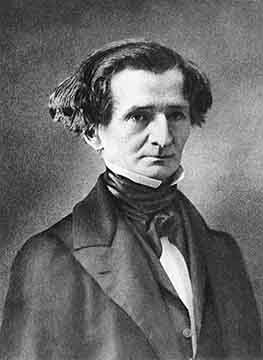Dutoit, Boston Symphony serve up a memorable Berlioz Requiem at Tanglewood

Hector Berlioz
The excitement was palpable in the Tanglewood Shed on Saturday night at the prospect of hearing Charles Dutoit lead the Boston Symphony Orchestra and the Tanglewood Festival Chorus in Berlioz’s Grande Messe des morts, commonly known as his Requiem.
A half-century earlier, the Swiss-born Dutoit had studied conducting on this very spot with Charles Munch, who (with Pierre Monteux) had established the French repertoire as a specialty of the BSO, which it remains. Munch had also led this orchestra in a classic recording of the Berlioz Requiem.
That point needs to be made because Berlioz, despite his nationality and his decades-long prominence in Paris (largely due to his critical writings), was in some ways not a French composer at all — his jarring originality hardly places him on a neat continuum from Lully to Debussy. Berlioz was Berlioz. His music still sounds distinctly odd, and not easily explained by reference to other composers.
So, while many conductors are capable of whipping up a suitably wild and hallucinogenic performance of this composer’s youthful Symphonie fantastique, the ability to inhabit the creative mind at work in Berlioz’s mature works is not granted to everyone with a baton. It’s hard to resist the twin temptations to impose conventional “symphonic” standards of voicing, blend, and continuity on the performance, or else to give in to the apparent capriciousness of scoring and mood as novelty for novelty’s sake.
No, to create the illusion of simply letting Berlioz be Berlioz requires a considerable leap of imagination. Dutoit and his forces made that leap on Saturday night, seemingly presenting us with the composer in person: still hard to understand, still challenging the listener with his creative choices at every turn.
Why, for example, set the Dies irae—typically an occasion for fortissimo wailing and gnashing of teeth—as a quiet meditation? Was it for contrast with the apocalyptic brass interruption at Tuba mirum? Why, conversely, set the brief prayer of Lacrymosa as a full-scale symphonic movement, with contrasting agitated and lyrical themes and a grand coda for the full ensemble, while according the much longer text of Quaerens me, with its emotion-laden imagery, only a short, chaste a capella chorus? This performance made one want to look up the composer’s phone number and ask him.
The Sanctus alternated a vigorous fugue on Hosanna with an angelic women’s chorus and the work’s only vocal solo. Tenor Russell Thomas seemed to grossly overemphasize the contrast between dolce beginnings and stentorian top notes, but who knows, maybe Berlioz would have loved it.
The impeccable diction of the Tanglewood Festival Chorus almost eliminated the need for a printed text. Their occasional, uncharacteristic groping for pitches in a capella sections was a sign of how unconventional Berlioz’s harmonies and voice-leading are even today.
The dozen-and-a-half BSO (and friends) brass players were arrayed in the center and far sides of the stage, not in the 360-degree, surround-sound formation favored by some conductors. (Dutoit’s choice, dictated in part by the configuration of the Shed and the lawn behind it, is thought by some to be closer to the composer’s intentions anyway.) Even while reveling in Berlioz’s world-shaking dissonances at maximum fortissimo, the players never lost their rich, golden sound—befitting messengers from the divine.
Dutoit’s firm grip on rhythm and pacing carried musicians and audience forward through music that could easily have seemed episodic and disjointed. As a glimpse into the mind of the master, this was a Requiem to remember.
Posted Jul 11, 2011 at 6:57 pm by Bill Waldron
I was there for this performance. It was a beautifully balanced presentation of this complex work. I think it was a memorable performance. The chorus was outstanding. Dutoit avoided the tempation to be bombastic and instead gave us a thoughtful rendition.
If you have a chance to hear this requiem performed live do not miss it.